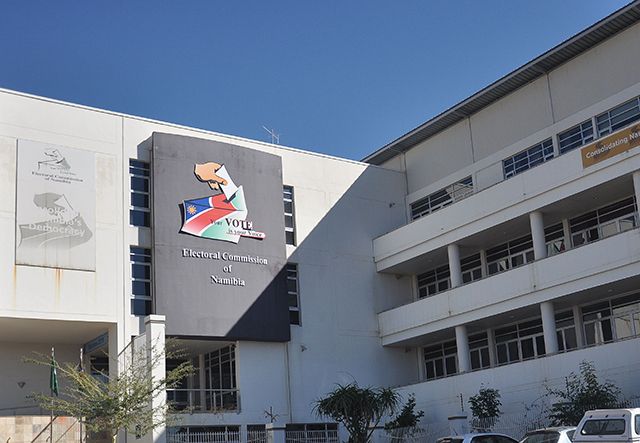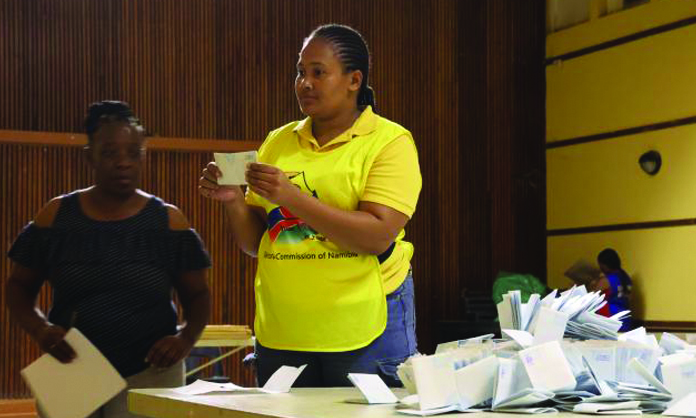A former fisherman’s daughter was forced to drop out of university in her second year after he lost his job due to the Fishrot corruption scandal.
Megameno Shikongo, who was studying accounting and finance at the University of Namibia, dropped out in 2020 when her father could not pay for her studies any more.
She now lives with her parents at the remote village of Omutele in the Oshikoto region.
Shikongo told an Institute for Public Policy Research (IPPR) research team she wanted to complete her studies to help her father as the family’s only breadwinner.
“The situation at home is terrible. We survive on the government feeding scheme. My father even sold his livestock to keep the family going,” she says.
UNEMPLOYED VOTERS
Shikongo’s story resonates with a multitude of Namibians who are struggling to find jobs ahead of the country’s Presidential and National Assembly elections on 27 November.
Namibia is regarded as one of the most unequal countries in the world.
It struggles with corruption, a stagnating economy and a high unemployment rate.
Since gaining independence from South African rule 34 years ago, Swapo has dominated the political landscape.
Two former presidents of the party, Hifikepunye Pohamba and Hage Geingob, have both declared strong anti-corruption stances.
However, despite their promises, corruption continues to surface, undermining public trust in the ruling party-led government.
DISAPPOINTMENT
On the streets of different towns of the country, many citizens are voicing their disappointment with the government’s efforts to fight corruption.
“Things will never change unless everybody works together. All parties promise a corrupt-free nation, but when they get into power, greed takes over,” says Elisa Josef from Walvis Bay.
Pewa Andreas, another Walvis Bay resident, believes those campaigning to become Namibia’s next president, already have plans for their family members.
“I am not sure if I want to vote or not. Things remain the same,” he says.
Unemployed resident Cornie Thomas says she does not have a house and is struggling to enrol her child at a Walvis Bay school.
ROTTEN APPLES
“It is all about who you know. There is a need to investigate officials in offices and root out the rotten apples who demand kickbacks for jobs and housing.
“People are corrupt, because leaders are corrupt. It has a ripple effect,” she says.
Elizabeth Shilumbu from Oshakati believes the government is not doing enough to fight corruption.
She says the Anti-Corruption Commission (ACC) hardly arrests corrupt senior government officials.
“For instance, those linked to the Fishrot scandal got arrested after they were exposed with material evidence released by the media.
“Had it not been for that, they would not have been arrested,” Shilumbu says.
Walvis Bay Rural constituency councillor Donatus Tegako says corruption will remain a problem in Namibia unless leaders stop being greedy.
‘CORRUPTION DOES NOT PAY’
“The whole system is corrupt. Citizens thus also learn to be corrupt like the leaders. We need to educate Namibians that corruption does not pay. It is not the way to prosper. Everyone is looking for an opportunity to get to the top, and only try to achieve it through corruption,” he says.
Tegako says there is a need to strengthen the watchdog system.
Kavango West youth activist Modestus Kasoma says the ACC should be strengthened by appointing commissioners who can give the director general recommendations to determine whether to continue with an investigation after preliminary investigations.
He says the national anti-corruption strategy and action plan should be fully implemented.
He says the ACC’s regional forums should be strengthened, with meetings at least three times a year, and governors should not be chairpersons of the forum, but rather ordinary members.
“Ordinary citizens have lost confidence in the government fighting corruption, and there is a lack of awareness from the ACC to educate communities on how to detect acts of corruption, prevent them, and report them,” Kasoma says.
‘NO PROTECTION’
He says there is no protection for activists or whistleblowers.
Kasoma says the heads of government departments are arrogant and do not cooperate with individuals who seek information in their offices to expose and report corruption.
“Civil society organisations ensure good governance by demanding transparency and accountability,” he says.
Action Democratic Movement leader Vincent Kanyetu says the country needs a completely independent anti-corruption commission to run its affairs without any interference – be it from the state or political parties.
“The current government is combating corruption. If we rate it in terms of percentage, I would say 15%.
“The so-called Anti-Corruption Commission focuses more on small cases, where poor people are being arrested for simple matters, for example, a school secretary taking school development funds,” he says.
Kanyetu says perpetrators are not brought to book.
“The nation has lost trust and hope in the ACC,” he says.
Kanyetu says the love of money “must be reduced in people’s hearts”, especially those who represent the masses, such as pastors, teachers, councillors and politicians.
‘DUBIOUS RANKING’
According to the 2024 Corruption Perceptions Index of Transparency International, Namibia is ranked 59th out of 180 countries on corruption.
ACC director general Paulus Noa, however, says many countries are no longer interested in Transparency International, because the way they rate countries is “dubious”.
Social justice activist Rinaani Musutua says corruption leads to poor governance and substandard service delivery.
“Public funds that could be used for poverty reduction are diverted into the hands of a select few, as exemplified by the Fishrot case,” she says.
She says the ACC must be empowered, independent and sufficiently funded.
Corruption thrives in environments where institutions are weak, transparency is lacking and accountability is absent, she says.
‘HOLISTIC APPROACH’
“A holistic approach that addresses these systemic issues is necessary to effectively combat corruption. Ultimately, the true test of political parties’ commitment to fighting corruption lies not in their words, but in their actions,” Musutua says.
She says perpetrators of corruption should be held accountable by ensuring effective governance, equitable service delivery and overall national development.
‘WEAK INSTITUTIONS’
Meanwhile, Landless People’s Movement youth leader Joyce Muzengua says Namibia’s anti-corruption institutions are weak.
“Appointments are not done based on merit, but on patronage,” she says.
Muzengua says Namibia does not have the necessary skills to fight white-collar crime and punitive measures for this is minimal.
“Namibia is not doing enough,” she says.
Muzengua believes in serious punitive measures, such as immediate suspension regardless of the position one holds in the government.
Lüderitz mayor Phil Balhao says his party, the Independent Patriots for Change, is committed to fostering transparency and accountability in governance.
According to him, the IPC manifesto outlines several key anti-corruption strategies that are crucial for promoting integrity in both the public and private sectors.
The IPC proposes enhancing the capacity of local institutions to combat corruption effectively, he says.
PROMISES
The National Empowerment Fighting Corruption party in its election manifesto promised that if voted into power, it would launch a national anti-corruption unit in all 14 regions.
“This unit has a 24-hour rapid response line to receive and respond to corruption-related complaints from the public,” the party says.
Stay informed with The Namibian – your source for credible journalism. Get in-depth reporting and opinions for
only N$85 a month. Invest in journalism, invest in democracy –
Subscribe Now!





